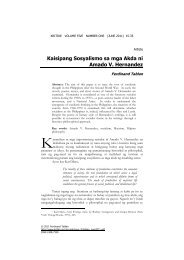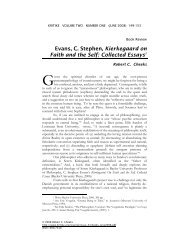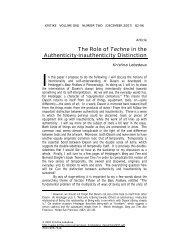In this Issue of KRITIKE: An Online Journal of Philosophy
In this Issue of KRITIKE: An Online Journal of Philosophy
In this Issue of KRITIKE: An Online Journal of Philosophy
Create successful ePaper yourself
Turn your PDF publications into a flip-book with our unique Google optimized e-Paper software.
<strong>KRITIKE</strong> VOLUME FIVE NUMBER ONE (JUNE 2011) i-iv<br />
Editorial<br />
<strong>In</strong> <strong>this</strong> <strong>Issue</strong> <strong>of</strong> <strong>KRITIKE</strong>:<br />
<strong>An</strong> <strong>Online</strong> <strong>Journal</strong> <strong>of</strong> <strong>Philosophy</strong><br />
Paolo A. Bolaños<br />
2011 is an important year for <strong>KRITIKE</strong>: <strong>An</strong> <strong>Online</strong> <strong>Journal</strong> <strong>of</strong><br />
<strong>Philosophy</strong>. This year marks the transition <strong>of</strong> the journal from a purely<br />
independent pr<strong>of</strong>essional open access journal <strong>of</strong> philosophy to being the<br />
<strong>of</strong>ficial academic journal <strong>of</strong> the Department <strong>of</strong> <strong>Philosophy</strong> <strong>of</strong> the University <strong>of</strong><br />
Santo Tomas. This transition prompted a process <strong>of</strong> streamlining our editorial<br />
procedures and the invitation <strong>of</strong> new members to the editorial board. We<br />
welcome these developments for they are signs <strong>of</strong> the journal’s maturity.<br />
Along with <strong>this</strong> maturity are the recent recognition by Humanities <strong>In</strong>ternational<br />
Complete (EBSCO Publishing) and the Modern Languages Association<br />
Directory <strong>of</strong> Periodicals, wherein <strong>KRITIKE</strong> is now abstracted and indexed.<br />
This ninth issue features papers that deal with Filipino philosophy,<br />
philosophical anthropology, issues about time and consciousness, political<br />
philosophy, hermeneutics, and aesthetics. A book review <strong>of</strong> a book about<br />
religion in the public sphere is also included.<br />
The first two essays are written in Filipino, which is the way the<br />
authors attempt to articulate, or create, what they think is Filipino <strong>Philosophy</strong>.<br />
For his part, F.P.A. Demeterio <strong>of</strong>fers a recount <strong>of</strong> the respective hermeneutics<br />
<strong>of</strong> Friedrich Schleiermacher and Wilhelm Dilthey, two foundational theorists in<br />
the hermeneutical tradition, in a paper called “<strong>An</strong>g Hermenyutika nina<br />
Friedrich Schleiermacher at Wilhelm Dilthey bilang Batayang Teoretikal sa<br />
Araling Pilipino.” The purpose <strong>of</strong> Demeterio’s recount is the attempt to<br />
contextualize the study, and use, <strong>of</strong> the hermeneutical methods <strong>of</strong><br />
Schleiermacher and Dilthey within the broader scope <strong>of</strong> Philippine Studies, but<br />
more specifically, in the study <strong>of</strong> local texts and culture. Meanwhile,<br />
“Kaisipang Sosyalismo sa mga Akda ni Amado V. Hernandez” by Ferdinand<br />
Tablan explores the socialistic content <strong>of</strong> the writings <strong>of</strong> the Filipino labor<br />
leader Amado Vera Hernandez. Tablan focuses on the short stories and<br />
poems <strong>of</strong> Hernandez as they tackle social issues in the Philippines during the<br />
1950s to the 1970s. Through a semi-historical narrative and exegesis <strong>of</strong><br />
Hernandez’s writings, Tablan is able to <strong>of</strong>fer a systematic reconstruction <strong>of</strong> the<br />
philosophical, deeply socialistic, bent <strong>of</strong> Hernandez’s thought.<br />
The next three papers could be classified, in broad terms, under<br />
philosophical anthropology. First is Fleurdeliz Altez-Albela’s “Corporeal<br />
Epiphanies <strong>of</strong> the Good in Emmanuel Levinas’ Ethics,” an articulation <strong>of</strong><br />
Levinasian ethics through a reading <strong>of</strong> the biblical <strong>An</strong>awim (“the poor <strong>of</strong><br />
Yahweh”). Altez-Albela explores the mechanism <strong>of</strong> altruism with the<br />
© 2011 Paolo A. Bolaños<br />
http://www.kritike.org/journal/issue_9/editorial_june2011.pdf<br />
ISSN 1908-7330
ii<br />
IN THIS ISSUE OF <strong>KRITIKE</strong><br />
presupposition that the poor is more privileged because the poor provides the<br />
ontological space for one’s “responsibility for the Other.” Through <strong>this</strong><br />
recognition <strong>of</strong> responsibility, the “I” is able to transcend itself and enrich its<br />
own existence. <strong>In</strong> “The Capable Human Being and the Role <strong>of</strong> Language in<br />
Paul Ricoeur’s Hermeneutical-Philosophical <strong>An</strong>thropology,” Peter Emmanuel<br />
Mara elaborates on the pr<strong>of</strong>oundly Socratic approach <strong>of</strong> Paul Ricoeur with<br />
regard to the self-examination <strong>of</strong> an individual’s life. Mara’s discussion centers<br />
around two interrelated themes in Ricouer’s thought: the capable human being<br />
and role <strong>of</strong> language. Mara notes that, for Ricoeur, a deep self-examination<br />
that culminates in the capable human being presupposes a narrative <strong>of</strong> the self,<br />
which Ricouer specifically associates with a hermeneutical approach to<br />
literature and acts <strong>of</strong> language. The third paper under philosophical<br />
anthropology relates pr<strong>of</strong>oundly, yet in a more or less second order manner, to<br />
Mara’s account <strong>of</strong> the narrative <strong>of</strong> the self. Jonathan Ray Villacorta, in,<br />
“Metanoia as a Response to <strong>Philosophy</strong>’s Death: From <strong>In</strong>justice to<br />
Conversion,” narrates the process <strong>of</strong> self-examination <strong>of</strong> the Japanese<br />
philosopher, Hajime Tanabe, who, according to Villacorta, “took the road less<br />
traveled and confronted the issue <strong>of</strong> flawed scientific philosophical position<br />
head-on.” What Tanabe had to reckon with was the Japanese intellectuals, like<br />
him, who feigned innocence at the face <strong>of</strong> Japan’s involvement in the Second<br />
World War by sanitizing their works. Villacorta maintains, “Tanabe becomes<br />
the leading intellectual that calls out to his people, but more so to himself, for a<br />
repentance, for a philosophical remorse that leads to metanoia or zange.” What<br />
Villacorta’s paper wishes to demonstrate is the possibility <strong>of</strong> a deeply<br />
philosophical approach to overcoming intellectual arrogance at the face <strong>of</strong> the<br />
wrong state <strong>of</strong> things.<br />
Fionn Murtagh, author <strong>of</strong> “Not Finitude but Countability:<br />
Implications <strong>of</strong> Imagination Positing Countability in Time,” discusses the<br />
relationship between time and imagination. Murtagh demonstrates how the<br />
imagination is able to elicit a model <strong>of</strong> time and how <strong>this</strong> model normatively<br />
conditions the mind in terms <strong>of</strong> finite and infinite cycles. Towards the end <strong>of</strong><br />
the paper, the author explores the implications <strong>of</strong> <strong>this</strong> relationship in terms <strong>of</strong><br />
collective intelligence, machine learning, and science; what is highlighted,<br />
however, is our capacity to handle information in creative and imaginative<br />
ways. Meanwhile, the Cartesian problematization <strong>of</strong> human consciousness is<br />
tackled by Ståle Gundersen in the essay “Is Consciousness a Non-spatial<br />
Phenomenon?” Gundersen revisits the classical notion <strong>of</strong> the mind-body<br />
dualism through the arguments <strong>of</strong> Colin McGinn. Gundersen basically<br />
reconstructs McGinn’s arguments followed by counterarguments, wherein the<br />
former contends that the non-perceptibility <strong>of</strong> consciousness does not<br />
necessarily entail non-spatiality.<br />
William Drischler, for his part, presents an examination <strong>of</strong> the recently<br />
published Fruehe Schriften zur Naturrecht (2003) <strong>of</strong> Gottfried Wilhelm Leibniz.<br />
<strong>In</strong> particular, Drischler shows how Leibniz engaged with Thomas Hobbes’<br />
“indivisible sovereignty idea” and how the former reverses the latter’s idea <strong>of</strong><br />
happiness. To be more specific, the Hobbesian idea <strong>of</strong> happiness is reversed,
P. BOLAÑOS iii<br />
Drischler notes, through Leibniz’s monadic notion <strong>of</strong> happiness, construed as<br />
a “plurality <strong>of</strong> happiness.” Drischler writes, “The plurality <strong>of</strong> happiness<br />
possibilities in various polities . . . is conceptualized by Leibniz as pro<strong>of</strong> <strong>of</strong><br />
degrees <strong>of</strong> state quality and (ultimately) sovereignty, degrees <strong>of</strong> sovereignty<br />
constituting Hobbes’ bête noire.”<br />
The next essay, “Shattering Tradition: Rorty on Edification and<br />
Hermeneutics,” written by Tracy <strong>An</strong>n P. Llanera, is an attempt to read Richard<br />
Rorty’s notion <strong>of</strong> edification within the context <strong>of</strong> the hermeneutical tradition.<br />
Llanera recounts Rorty’s revaluation <strong>of</strong> the philosophical tradition, identifying<br />
two basic philosophical approaches: philosophy is either an attempt “to get to<br />
the bottom <strong>of</strong> things, to mirror nature and achieve certainty” or provokes “us<br />
to be more creative, even experimental, in our interpretations <strong>of</strong> our lifesituations.”<br />
The hermeneutical character <strong>of</strong> philosophy, therefore, is at the<br />
center stage <strong>of</strong> Llanera’s piece. <strong>Philosophy</strong> is presented—akin to Nietzsche,<br />
Heidegger, Adorno, Ricouer, and Deleuze—as a counterculture to<br />
hypostatization, a gesture <strong>of</strong> “shattering tradition” in order to create<br />
possibilities, in order to edify.<br />
Ryan Johnson <strong>of</strong>fers the last essay under the Articles section. <strong>In</strong> “<strong>An</strong><br />
Accord in/on Kantian Aesthetics (or the Sensus Communis: Attunement in a<br />
Community <strong>of</strong> Diverse Sites <strong>of</strong> Purposiveness),” Johnson experiments with<br />
Kant’s Critique <strong>of</strong> Judgment by focusing on the concepts <strong>of</strong> “purposiveness<br />
without purpose” and “sensus communis.” The author contends that three forms<br />
<strong>of</strong> purposiveness without purpose can be elicited from aesthetic judgments,<br />
namely, object, subject, and pleasure. Moreover, Johnson contends that it is a<br />
great mistake to ignore the import <strong>of</strong> the notion <strong>of</strong> sensus communis as the<br />
universality and necessity <strong>of</strong> aesthetic judgments are gleaned from <strong>this</strong><br />
normative/ontological condition.<br />
Finally, Lukas Kaelin contributes his review <strong>of</strong> The Power <strong>of</strong> Religion in<br />
the Public Sphere (New York: Columbia University Press, 2011). The book is<br />
edited by Eduardo Mendieta and Jonathan Vanantwerpen and is presented as a<br />
debate-cum-dialogue between leading philosophers, such as, Judith Butler,<br />
Jürgen Habermas, Charles Taylor, and Cornel West. Kaelin notes the<br />
importance <strong>of</strong> debating on the role <strong>of</strong> religion amidst the social and political<br />
crises we are facing and highlights the important contributions <strong>of</strong> the<br />
philosophers participating in the debate-cum-dialogue. He, however, remarks<br />
that, while “different perspectives are provided . . . conceptual clarity is<br />
missed.” The book, the reviewer notes, is nonetheless a stimulating<br />
introduction to an important philosophical issue <strong>of</strong> the role <strong>of</strong> religion in the<br />
public/political sphere.<br />
At <strong>this</strong> juncture, in pr<strong>of</strong>ound gratitude, I would like to mention the<br />
names <strong>of</strong> our peers who contributed to the completion <strong>of</strong> <strong>this</strong> edition: Our<br />
colleagues from De La Salle University-Taft—Dr. F.P.A. Demeterio, Dr. Jose<br />
Rhommel B. Hernandez, and Dr. Jeremiah Joven Joaquin; Mr. Renato<br />
Manaloto <strong>of</strong> the University <strong>of</strong> the Philippines-Diliman; and Dr. Robert<br />
Montaña <strong>of</strong> the University <strong>of</strong> Santo Tomas. Special thanks to the journal’s
iv<br />
IN THIS ISSUE OF <strong>KRITIKE</strong><br />
new Managing Editor, Mr. Roland Theuas S. Pada, for taking the extra burden<br />
in helping me with the final preparation and release <strong>of</strong> <strong>this</strong> issue.<br />
I would also like to acknowledge the new members <strong>of</strong> our Editorial<br />
Team—Marella Ada Mancenido-Bolaños, Darlene Demandante, Tracy <strong>An</strong>n P.<br />
Llanera, Wendyl Luna, and Jonathan Ray Villacorta; as well as the new<br />
members <strong>of</strong> the journal’s <strong>In</strong>ternational Advisory Board: Dr. Karin Bauer <strong>of</strong><br />
McGill University, Dr. Julius D. Mendoza <strong>of</strong> the University <strong>of</strong> the Philippines-<br />
Baguio, Dr. Karl-Heinz Pohl <strong>of</strong> Universität Trier, Dr. Nicholas H. Smith <strong>of</strong><br />
Macquarie University, Dr. John Rundell <strong>of</strong> the University <strong>of</strong> Melbourne, and<br />
Dr. Vincent Shen <strong>of</strong> the University <strong>of</strong> Toronto. A warm welcome to the<br />
Editorial Board <strong>of</strong> <strong>KRITIKE</strong>: <strong>An</strong> <strong>Online</strong> <strong>Journal</strong> <strong>of</strong> <strong>Philosophy</strong>!<br />
Department <strong>of</strong> <strong>Philosophy</strong>, University <strong>of</strong> Santo Tomas, Philippines
















